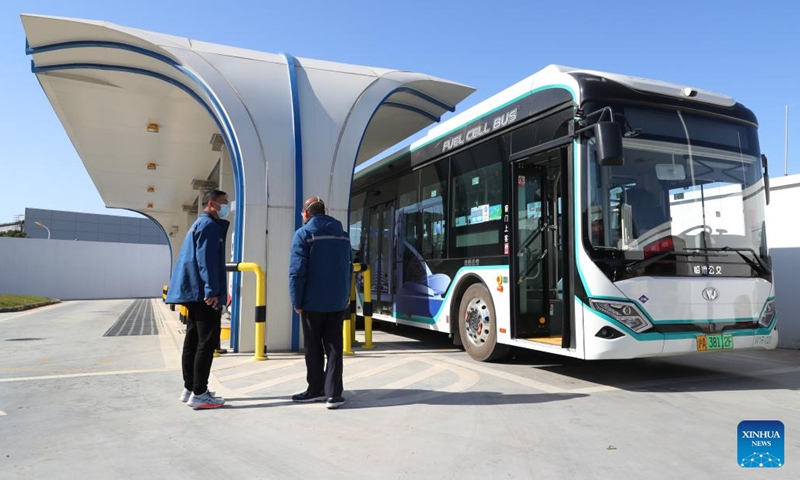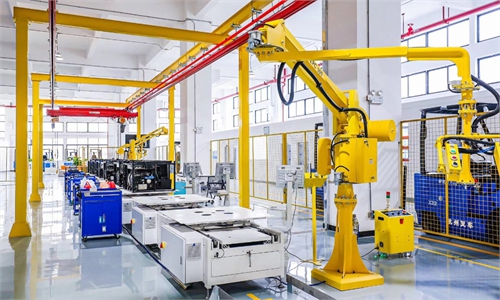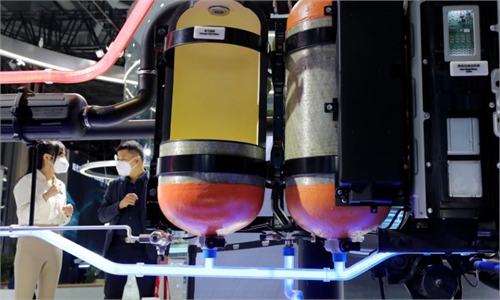NPC deputies propose to accelerate clarification of hydrogen’s management, boost infrastructure

A hydrogen fuel cell-powered public bus is refueled at a hydrogen refueling station in Lingang new area of Pudong New Area in east China's Shanghai, Dec. 15, 2022. (Photo: Xinhua)
As one of the strategic energy categories of China's green transformation, hydrogen is playing a bigger role. Yet the management mechanism of the energy source and relevant infrastructure still need to catch up quickly to boost the nascent sector, industry observers said.
It is time that the clarification of hydrogen's management should speed up to promote the industry's rapid development, said Xue Jiping, a deputy to the 14th National People's Congress (NPC), who is also the legal representative of a hydrogen company.
Most areas still classify hydrogen as a hazardous chemical for management, resulting in heavy resistance at the grassroots level in the green process of hydrogen production and the location of hydrogen projects, thus directly restricting the hydrogen industrial chain, according to Xue.
A hydrogen energy management mechanism should be established at the national level to standardize the construction and management procedures of hydrogen energy preparation, storage, transportation and refueling, in an effort to smooth out institutional obstacles and policy bottlenecks that restrict industrial development, he said.
Hydrogen is regarded as one of the most promising sources of clean energy. More than 30 countries and regions around the world have issued hydrogen energy development strategies. It can be produced from various sources of primary energy, including coal, natural gas and renewable energy through power generation.
As the world's largest hydrogen producer with 33 million tons annually, China unveiled a blueprint for the sector's development last year.
It said that by 2025, the country will have about 50,000 hydrogen fuel-cell vehicles and its annual hydrogen production from renewable energy will reach 100,000 to 200,000 tons, according to the plan jointly released by the National Development and Reform Commission, and the National Energy Administration.
"China has intensively introduced relevant policies in the field of hydrogen energy, from the central government to local governments, over the past two years, involving financial support, tax incentives, technology research and development (R&D) and hydrogen refueling stations, which effectively promoted the sector's development," said Zhang Guoqiang, a deputy to the 14th NPC and chairman of Beijing Sinohytec, which engages in the R&D and industrialization of hydrogen fuel cell engine technology.
Though hydrogen energy has broad prospects, it is still in the early stages of application and commercialization, Zhang said, as there are still hurdles such as high costs, a limited number of refueling stations and insufficient infrastructure.
Zhang suggested that there should be more demonstration city clusters of fuel cell vehicles. Areas with good economic foundations, abundant hydrogen sources and good industrial supporting structures should be included in the fuel cell vehicle demonstration city cluster to play a pioneer role in promoting hydrogen fuel cell vehicles.
In 2022, production of hydrogen fuel cell vehicles in China stood at 3,626, up by 105.4 percent year-on-year, and sales went up by 112.8 percent to 3,367 units, according to data from the China Association of Automobile Manufacturers.
Global Times



